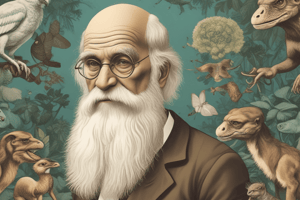Podcast
Questions and Answers
What event did Darwin experience in Chile that influenced his thinking?
What event did Darwin experience in Chile that influenced his thinking?
- An earthquake (correct)
- A flood
- A drought
- A tornado
What was the main concern of Thomas Malthus regarding population growth?
What was the main concern of Thomas Malthus regarding population growth?
- The population would lead to an increase in wealth
- The population would lead to an inevitable shortfall of food (correct)
- The population would grow exponentially
- The population would eventually stabilize
What is the main idea behind Social Darwinism?
What is the main idea behind Social Darwinism?
- That humans are subject to the same laws of natural selection as plants and animals (correct)
- That humans are not subject to natural selection
- That all humans are equal in the struggle for existence
- That only the strongest humans survive
What is one of the motivations for imperialism mentioned in the text?
What is one of the motivations for imperialism mentioned in the text?
What is the main issue that people in colonies may have with their empire?
What is the main issue that people in colonies may have with their empire?
What is the definition of imperialism according to the Oxford Dictionary?
What is the definition of imperialism according to the Oxford Dictionary?
What was a key difference between Darwin's scientific thinking and traditional thinking of the time?
What was a key difference between Darwin's scientific thinking and traditional thinking of the time?
What did Darwin observe about the finches on the Galapagos Islands?
What did Darwin observe about the finches on the Galapagos Islands?
What did Darwin infer from his observation of the finches on the Galapagos Islands?
What did Darwin infer from his observation of the finches on the Galapagos Islands?
What was the main argument of Charles Lyell's book 'Principles of Geology'?
What was the main argument of Charles Lyell's book 'Principles of Geology'?
What was the significance of the Galapagos Islands in Darwin's thinking?
What was the significance of the Galapagos Islands in Darwin's thinking?
What did Darwin notice about the species of finches between the islands?
What did Darwin notice about the species of finches between the islands?
Study Notes
Darwinism and Traditional Thinking
- Traditional thinking: based on religious dogma, emphasizes divine creation, and does not consider change as desirable
- Darwinism: emphasizes the importance of the environment, and that change and progress are possible and common
Galapagos Finches and Adaptation
- In 1835, Darwin examined finches on Galapagos Islands and found that species of finches between the islands were different, despite similar climates and geology
- He observed a perfect gradation in the size of beaks in different species of Geospiza, from large to small
- This led him to think about change in nature and how finches adapted to different environments
Influences on Darwin's Views
- Charles Lyell's Principles of Geology (1830): argued that slow natural forces, not Biblical forces, affected the earth's formation, and that the earth's crust shifted
- Darwin's experience of an earthquake in Chile, where he saw the ground rise by eight feet
- Thomas Malthus's ideas on population growth, inequality, and struggle for existence (1838): led Darwin to think about struggle and survival in the wild
Social Darwinism and Imperialism
- Social Darwinism: the theory that persons, groups, and races are subject to the same laws of natural selection as plants and animals in nature
- Popular in the late 19th and early 20th century, it posits that the struggle for existence is present between humans in society, leading to survival of the fittest
- Imperialism: a policy of extending a country's power and influence through diplomacy or military force, often motivated by economic, national prestige, and conversion to Christianity
- Nationalism and Imperialism: empires like Russia, Austria-Hungary, Ottomans, and Britain control a lot of territory, leading to pride and nationalism in the mother-country, but often resistance and desire for independence in the colonies
Studying That Suits You
Use AI to generate personalized quizzes and flashcards to suit your learning preferences.
Description
This quiz covers the experiences and observations of Charles Darwin and Thomas Malthus. It explores their ideas on population growth, industrialization, and the impact on society. Learn about the effects of urbanization and the struggle for daily existence.


